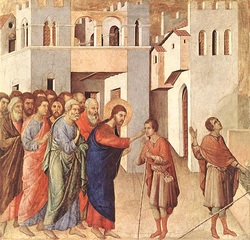
Sermon by St. Gregory the Pope
Our Redeemer, foreseeing that his disciples would be troubled in their minds at his passion, announced to them long beforehand both the sufferings of his passion and the glory of his resurrection; to the end that, when they should see him die, as he had foretold, they might not doubt he was likewise to rise again. But, since his disciples were yet earthly-minded, and by no means able to understand this mystery, he wrought a miracle before them. A blind man receiveth his sight before their eyes, that if they could not receive heavenly things by words, they might be persuaded of heavenly things by deeds.
But, dearly beloved brethren, the miracles of our Lord and Saviour must be accepted in a two-fold manner; we must believe that they were actually wrought, and at the same time were intended to signify something to us. For God's works shew one thing by their power, and another by their mystery. For instance, take this present miracle. We know not historically who this blind man was, but we do know of what he was mystically the figure. Man verily is blind, driven out from Eden, the Garden of Earthly Delight, in the persons of his first parents, knowing not the light of heaven, and suffering the darkness of condemnation. But, nevertheless, through the coming of his Redeemer, he is enlightened, so that now he already seeth by hope the gladness of inward light, and walketh by good works, in the path of life.
We must note also that the blind man received his sight as Jesus drew near to Jericho. Now, this name Jericho, being interpreted, signifieth City of the Moon; and in Holy Scripture the moon is used as a figure of our imperfect flesh, of whose gradual corruption her monthly waning is a type. As, therefore, our Maker draweth nigh to Jericho, a blind man receiveth his sight. And because the Godhead taketh into itself our weak manhood, man receiveth again the light which he had lost. By God's suffering in the Manhood, man is raised up toward God. This blind man is also well described as sitting by the wayside begging; for the Truth saith: I am the Way.




